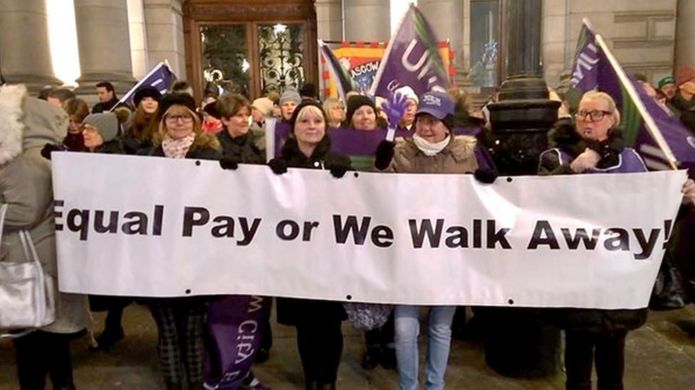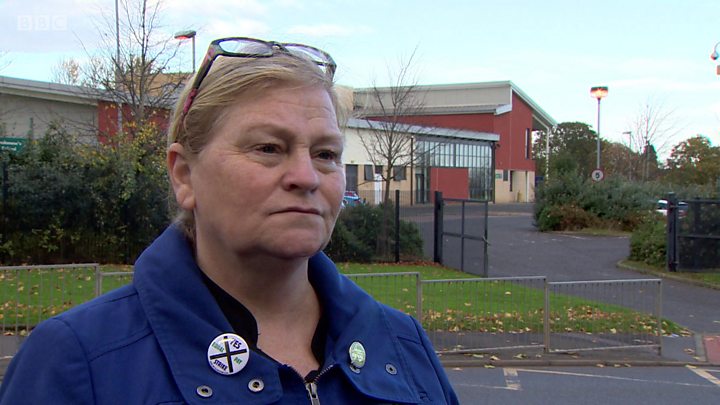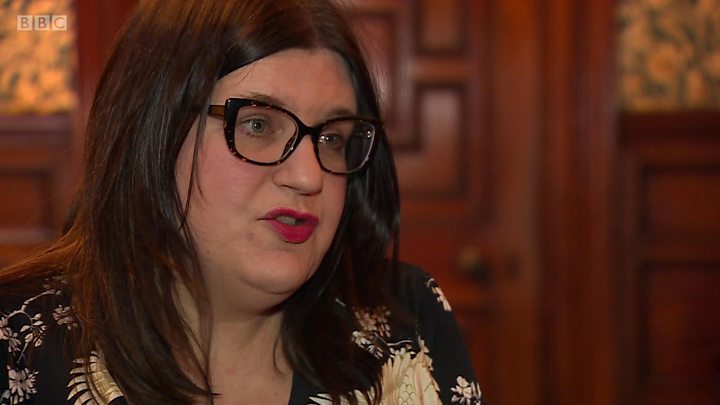Glasgow's Fight for Equal Pay

BBC Scotland sets the scene for today's historic equal pay strike in Glasgow City Council.
Council Leader Susan Aitken's claim that she's 'not entirely sure why this strike is taking place' is completely disingenuous if you ask me.
The strike is taking place because after more than 10 months and 21 separate meetings with senior council officials, the serious settlement negotiations that were promised by Glasgow City Council earlier this year have still to get underway.
If settlement talks were making good progress, as Susan Aitken suggests, there would be no strike and Glasgow's 13,000 equal pay cases would not be heading back to the Employment Tribunals - which they are!
https://www.bbc.co.uk/news/uk-scotland-glasgow-west-45941552
Schools and home care disrupted by Glasgow equal pay strike

Image captionUnions claim there has been no progress despite the council's pledge to agree a settlement plan by the end of the year
Hundreds of schools and home care services in Glasgow face disruption as council workers begin a 48-hour strike over equal pay.
Primary schools and nurseries will be shut and other services could be hit.
About 8,000 workers will strike amid a "lack of progress" on equal pay claims from thousands of female workers, the GMB and Unison said.
Glasgow City Council said the strike was unnecessary and it hoped to reach agreement in the coming months.
Hundreds of schools and home care services in Glasgow face disruption as council workers begin a 48-hour strike over equal pay.
Primary schools and nurseries will be shut and other services could be hit.
About 8,000 workers will strike amid a "lack of progress" on equal pay claims from thousands of female workers, the GMB and Unison said.
Glasgow City Council said the strike was unnecessary and it hoped to reach agreement in the coming months.
• Q&A: What is the Glasgow dispute all about?
Thousands to strike over equal pay
The local authority announced in January that it planned to reach a negotiated settlement to thousands of equal pay claims arising from a pay and conditions scheme introduced more than a decade ago.
Campaigners say the scheme led to workers in female-dominated roles such as catering or cleaning receiving up to £3 an hour less than those in male-dominated areas such as refuse collection.
Thousands to strike over equal pay
The local authority announced in January that it planned to reach a negotiated settlement to thousands of equal pay claims arising from a pay and conditions scheme introduced more than a decade ago.
Campaigners say the scheme led to workers in female-dominated roles such as catering or cleaning receiving up to £3 an hour less than those in male-dominated areas such as refuse collection.
Council services affected by the strike
- All mainstream primary schools, nurseries and additional support schools closed
- Secondary schools will remain open but services such as school meals will be affected
- Home care services - help with washing, getting dressed, meal preparation - face significant disruption
- Museums, leisure services and libraries will open but cafes and cleaning services could be disrupted
Following two judgements against the council in the Court of Session, the SNP-led administration said it had "grasped the nettle" and planned to settle about 12,000 claims.
Unions, however, say the talks - which would pave the way for payouts - have made no progress despite 21 meetings being held in the past 10 months.
Unions, however, say the talks - which would pave the way for payouts - have made no progress despite 21 meetings being held in the past 10 months.

Media caption - Carol Qua says 'We're just fighting to get what we're entitled to, an equal pay'
GMB Scotland organiser Rhea Wolfson said: "The voice of Glasgow's working women will be heard around the world. After decades of rampant sex discrimination they will tell their employer, 'Stop the delays. We want justice.'"
Unison Glasgow chairwoman Mary Dawson added: "We have given the council 10 months to make progress on addressing the historical discrimination suffered by these workers.
"However, the council has agreed nothing, offered nothing and all we have had are meetings about meetings and talks about talks. It's time for some action."
Timeline - Glasgow equal pay dispute
- 2006 - Glasgow City Council draws up its own bespoke job evaluation scheme, the Workforce Pay and Benefits Review (WPBR), intended to comply with equal pay law.
- From 2009 claimants challenge the scheme through employment tribunals, arguing it favours workers in male-dominated roles.
- May 2017 Court of Session rules that women were wrongly excluded from a bonus protection scheme. In the same month the SNP becomes the biggest party on Glasgow City Council after years of Labour control, and forms a minority administration.
- August 2017 - Court of Session rules the WPBR was less favourable to women workers.
- January 2018 - Glasgow City Council announces it intends to reach a negotiated settlement over equal pay.
- October 2018 - GMB and Unison members stage 48-hour strike in protest at lack of progress in talks.
The council insists progress has been made, and it had hoped to agree a settlement figure in December, although this could be delayed because of the industrial action.
Council leader Susan Aitken said: "I'm not entirely sure why this strike is taking place.
Council leader Susan Aitken said: "I'm not entirely sure why this strike is taking place.

Media caption - Council leader Susan Aitken says industrial action is unnecessary
"Negotiations have been continuing. We've made considerable progress in a number of areas."
She highlighted a decision to bring women who worked for arms length body Cordia back into direct council employment and the harmonisation of their terms and conditions.
She added: "There's going to be enormous disruption caused in Glasgow - and to some of the most vulnerable people in the city. Some people who are at end of life, receiving end of life care."
Financial challenges ahead
Campaign group Action 4 Equality has estimated that backdated claims and pay increases could eventually cost the council between £500m and £1bn.
Ms Aitken has disputed that figure, but acknowledged the council faces financial challenges.
Some have speculated the authority may be forced to sell off assets such as the Scottish Event Campus (SEC) or the Salvador Dali masterpiece Christ of St John of the Cross, normally displayed at the Kelvingrove Art Gallery and Museum.
Earlier this year, Ms Aitken insisted officials were not discussing "flogging off the Dali" but were drawing up proposals that would minimise the impact on jobs and services.
The strike begins at 07:00 on Tuesday. Strikers plan to gather at Glasgow Green from 11:30 and march to City Chambers in George Square.
Campaign group Action 4 Equality has estimated that backdated claims and pay increases could eventually cost the council between £500m and £1bn.
Ms Aitken has disputed that figure, but acknowledged the council faces financial challenges.
Some have speculated the authority may be forced to sell off assets such as the Scottish Event Campus (SEC) or the Salvador Dali masterpiece Christ of St John of the Cross, normally displayed at the Kelvingrove Art Gallery and Museum.
Earlier this year, Ms Aitken insisted officials were not discussing "flogging off the Dali" but were drawing up proposals that would minimise the impact on jobs and services.
The strike begins at 07:00 on Tuesday. Strikers plan to gather at Glasgow Green from 11:30 and march to City Chambers in George Square.

